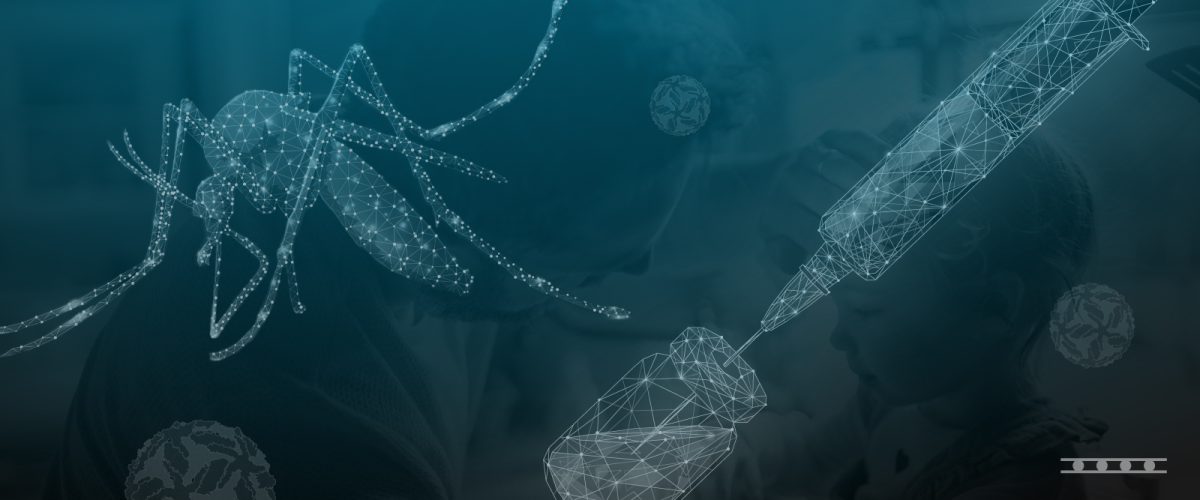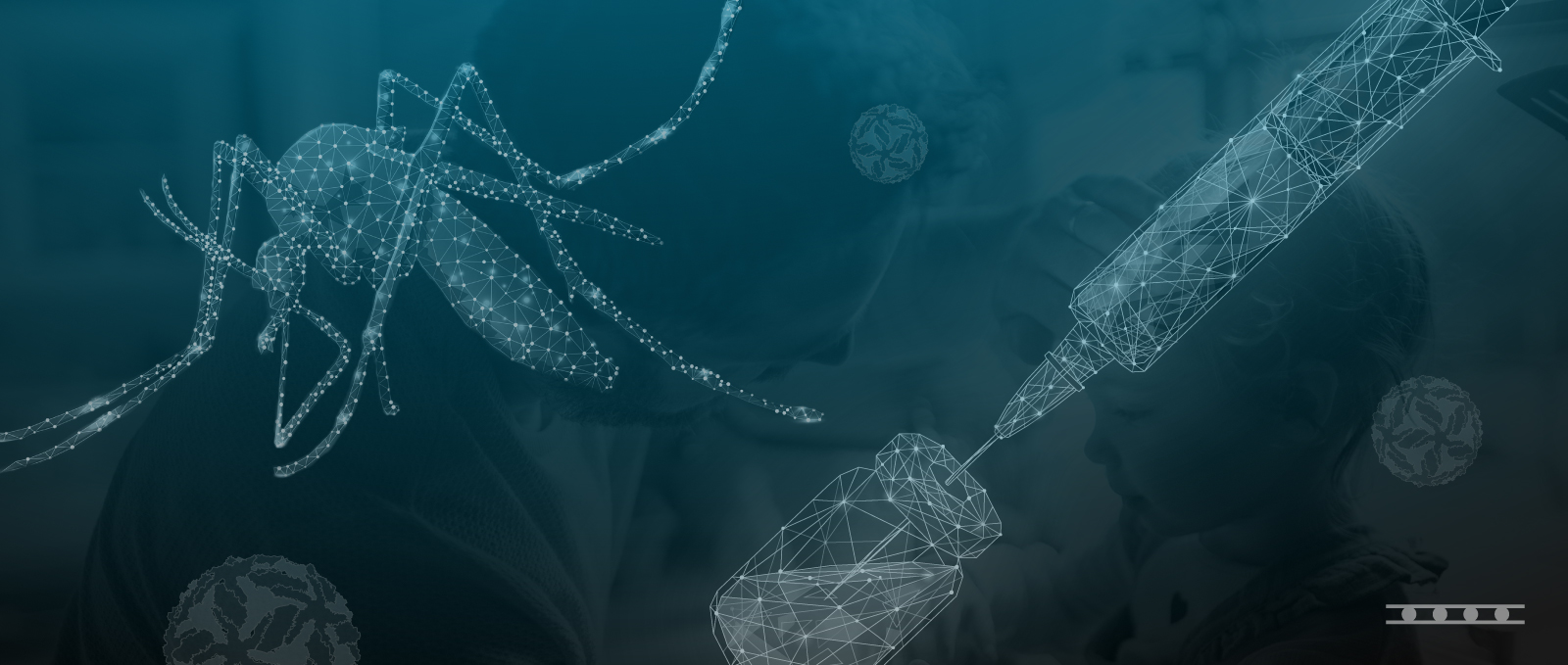What is dengue fever, and how can it be prevented?
Dengue fever is caused by a virus within the genus Flavivirus, the same genus that Zika virus (ZIKV) belongs to. Most people infected with dengue virus (DENV) experience no symptoms. However, 25% of people exhibit symptoms including nausea, vomiting, rash, aches and pain. Dengue fever is usually mild and goes away in a week. About 1 in every 20 symptomatic persons will get severe dengue fever, which can cause internal bleeding, organ damage, a sudden drop in blood pressure (shock) and death.1
There are four distinct, but closely related, types of DENV called serotypes (DENV 1-4). Infection with a particular serotype confers protection (immunity) against that serotype for the rest of one’s life. For this reason, if an infected person gets infected a second time (secondary infection) with the same serotype, this person will be protected. However, this immunity does not protect you from a secondary infection caused by a different serotype. A secondary infection with a different serotype might cause a severe case of dengue fever.2
There is no specific treatment for dengue fever but supportive care can help manage the symptoms. There is only one vaccine approved by the FDA, called Dengvaxia® from Sanofi, to prevent severe disease. It is approved for children between the ages of 9 and 16 who live in an endemic area and who have had a previous DENV infection confirmed by a laboratory serological assay.3
Why is it necessary to test children prior to Dengue vaccination?
Children who have been vaccinated, but have never been infected with DENV, are at a high risk of developing severe dengue fever. This phenomenon is caused by something called antibody-dependent enhancement (ADE).4
ADE has been observed for some viruses such as dengue virus, respiratory syncytial virus (RSV) and measles.5 ADE can happen in two different ways when it comes to DENV:
1) a DENV infected person gets a secondary infection with a different DENV serotype
2) a vaccinated person that has not been infected with DENV gets a primary DENV infection
In the first scenario, antibodies from the primary infection do not neutralize the virus, but instead mask it. This masking allows the virus to enter the cells and evade the immune response. The same situation occurs in scenario 2 when a vaccinated person becomes infected for the first time. The antibodies produced against the vaccine do not neutralize the virus, but instead, help it to infect cells. Consequently, in both scenarios, there is an increase in viral replication resulting in severe disease. For this reason, it is critical to screen children before vaccination for previous DENV infection. This helps to reduce the risk of developing severe disease.
As most primary dengue infections are asymptomatic, the most appropriate screening method is to detect IgG antibodies against DENV. IgG antibodies indicate a previous dengue infection. Therefore, only children who test positive for IgG will be immunized. To detect a previous DENV infection, very specific serological testing is required. This is because Flaviviruses (such as Zika, Dengue, and Yellow Fever virus) are very similar, and antibodies against ZIKV also bind DENV. As a result, if an IgG assay is not highly specific, false-positive results can occur because the DENV assay could detect antibodies against ZIKV. False-positive results increase the risk of severe dengue in children who have been immunized.
Dengue in Puerto Rico and how vaccination is being implemented
Dengue virus is mainly transmitted by mosquitoes from the Aedes species. Therefore, dengue fever can be found anywhere mosquitoes breed, including tropical and subtropical locations. Dengue fever is the major cause of hospitalization and death in various Asian, Central, and South American countries.6 Dengue fever is endemic (often found) in Puerto Rico, the US Virgin Islands, and American Samoa in the United States and its territories. Furthermore, locally transmitted cases have been documented in Florida, Hawaii, and Texas on a rare basis. The largest number of dengue cases, including severe cases, are seen in Puerto Rico, particularly among children aged 10 to 16.3
In Puerto Rico, dengue fever is a public health concern. To limit dengue transmission, several interventions have been and are being adopted, such as applying insect repellents to avoid mosquito bites or wearing long-sleeved shirts and pants. Additionally, mosquito breeding is continually being prevented in Puerto Rico, for example, by cleaning or emptying stagnant water.7 In addition to these efforts, the Puerto Rico Department of Health is working on the deployment of the dengue vaccination for children in Puerto Rico, in conjunction with the CDC and the Puerto Rico Science, Technology, and Research Trust.
The Advisory Committee on Immunization Practices (ACIP) guidelines for the use of the Dengvaxia vaccine in the United States were published by the CDC in December 2021. The CDC evaluated all the dengue IgG tests on the market in the United States. Based on the results of the study, the CDC identified a laboratory-based 2-test algorithm to distinguish children and adolescents who could benefit from vaccination from those without a previous dengue infection (sensitivity ≥75% and specificity ≥98%).8
The EUROIMMUN Anti-Dengue Virus NS1 Type 1-4 ELISA (IgG) is part of this 2-test algorithm.8
Puerto Rican labs are currently validating the CDC 2-test algorithm to soon begin the screening for children and adolescents between the ages of 9 and 16 for eligibility to receive the vaccine.
References
- CDC. CDC clinical presentation. https://www.cdc.gov/dengue/healthcare-providers/clinical-presentation.html#:~:text=Severe%20dengue%20is%20defined%20by,impaired%20consciousness%2C%20or%20heart%20impairment. Accessed March 11, 2022.
- Changal KH, Raina AH, Raina A, et al. Differentiating secondary from primary dengue using IgG to IgM ratio in early dengue: an observational hospital based clinico-serological study from North India. BMC Infect Dis. 2016;16(1):715-715.
- Paz-Bailey G, Adams L, Wong JM, et al. Dengue Vaccine: Recommendations of the Advisory Committee on Immunization Practices, United States, 2021. MWR Recomm Rep 2021;70(No. RR-6):1–16(No. RR-6):1–16.
- Philadelphia CsHo. Antibody-dependent Enhancement (ADE) and Vaccines. https://www.chop.edu/centers-programs/vaccine-education-center/vaccine-safety/antibody-dependent-enhancement-and-vaccines. Accessed March 11, 2022.
- Lee WS, Wheatley AK, Kent SJ, DeKosky BJ. Antibody-dependent enhancement and SARS-CoV-2 vaccines and therapies. Nature Microbiology. 2020;5(10):1185-1191.
- WHO. Dengue and severe dengue. https://www.who.int/en/news-room/fact-sheets/detail/dengue-and-severe-dengue. Accessed March 9, 2022.
- Health PRDo. How to prevent Dengue. https://www.salud.gov.pr/CMS/435#:~:text=El%20m%C3%A9todo%20principal%20para%20controlar,lugares%20donde%20depositar%20sus%20huevos. Accessed March 11, 2022.
- CDC. Laboratory Testing Requirements for Vaccination with Dengvaxia Dengue Vaccine. https://www.cdc.gov/dengue/vaccine/hcp/testing.html. Accessed March 11, 2022.







